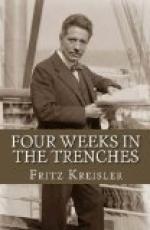Around eight o’clock at night the fight was stopped for want of light, and we took up our newly acquired positions, entrenched them well, and began to make ready for the night. Orders for outpost duty were given and the officers were again called to the brigadier-colonel, who in a few words outlined the situation to us, thanking us for the pertinacity and bravery shown by the troops, and adding that the success of the expedition lay in the fact that we had arrived in time to save the situation.
Then the question of transporting prisoners to the rear came up, and while the brigadier’s eyes were searching us I felt that he was going to entrust me with that mission. He looked at me, gave me the order in a short, measured way, but his eyes gazed searchingly and deeply into mine, and I thought I understood the unspoken message. So, tired as I was, I immediately set out with a guard of twenty men to transport the two hundred and forty Russian prisoners, among whom were two officers, back behind the fighting line. They seemed not unhappy over their lot—in fact, were smoking and chatting freely while we marched back. One of the Russian officers had a wound in his leg and was carried on a stretcher, but he, too, seemed quite at ease, conversing with me in French and congratulating me upon the bravery our isolated detachment had shown against the terrific onslaught. As soon as I had delivered them safely into the hands of the commander of our reserves, I inquired the way to the nearest field hospital in search of the young officer, the son of our brigadier-colonel. It was then about nine o’clock at night, and on entering the peasant’s hut where the field hospital was established, I saw at a glance that I had come too late. He lay there still, hands folded over his breast with as serene and happy an expression as if asleep. His faithful orderly sat weeping next to him, and some kind hand had laid a small bunch of field flowers on his breast.




